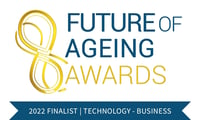Discover the benefits of clinical information systems in your residential care setting

A clinical information system ensures that residents in aged care settings are receiving the best quality of life through enhanced delivery of care and access to information.
One of the ways in which clinical information systems are improving the quality of life for both residents and staff in residential aged care settings is the amount of time that the solutions save. This is time that, with paper-based systems, would have been spent performing mundane and unnecessary administrative tasks, but there are also many more ways in which clinical information systems benefit aged care settings, such as enhanced oversight of information, more accurate progress notes and the ability to provide more efficient, person-centred care.
Below, we’ll discuss how clinical information systems can have a significant positive impact on your aged care setting.
Clinical information systems save time
Often, those working in residential aged care can lose hours at a time sifting through paper records trying to find the information they need for a resident or for evidencing purposes. And even when they find this information, it’s always somewhat out of date due to the fast-changing nature of a residential aged care setting. But thanks to clinical information systems, staff can access the information they need, all recorded at the point of care and updated in real-time, almost instantly. All it takes is a few clicks and they have saved themselves potentially hours of searching!
Harnessing the technology made available by using a clinical information system, residential care settings can augment the human element of care provision by minimising the time needed to spend on administrative tasks and therefore have more time to spend with residents. This doesn’t just mean spending time with residents doing the things they enjoy but having more time to get to know residents and form a bond with them.
Better reporting and analysis of trends
Not only do clinical information systems save time by making it easier and quicker to gain access to pertinent resident information and complete administrative tasks, but it also improves the overall process of reporting.
Whether it’s documenting care in real-time or gathering information for accreditation from regulatory bodies, clinical information systems can vastly improve the way in which residential care settings can analyse information and monitor trends to ensure best practice when it comes to care management and governance of operations.
Supports proactive, person-centred care
Because clinical information systems enable aged care settings to save significant amounts of time and also improves their capabilities to analyse trends and gather data to enhance governance and best practices, this has a significant impact on the quality of care that can be provided to residents. Not only this, but the quick and easy access to data, and the ability for this data to be shared safety, also enhances the ability to provide person-centred care.
For example, a clinical information system can provide quick and seamless information sharing between different healthcare professionals and anyone else involved in the care of those living in aged care. This makes for a much safer and more efficient process of delivering holistic care whatever the setting.
Because of the ability to view overarching information, with access to detailed documents on an individual's preferences and needs, this also means that those working in aged care settings can hone in on what will make for the best type of care for each individual, ensuring that everybody is getting the type of care they need.
Discover how mCare can save you time
For more information on our clinical information system, mCare, why not book a consultation and speak with one of our experts?











